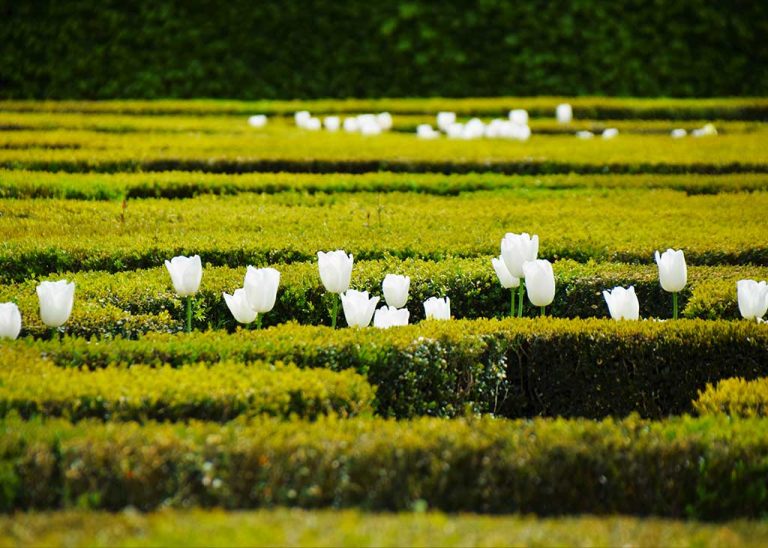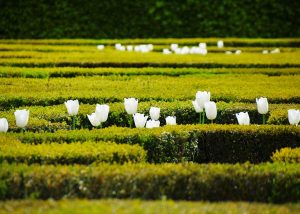Organic Garden
For more than ten years, the gardens of Villandry have taken the turn of an organic maintenance. The first efforts focussed on the kitchen gardens, where the working methods have been entirely rethought, with the motto “observe to anticipate and anticipate to avoid using chemical treatments”. For the team of gardeners, this is no mean task: in addition to a new work organisation, certain tools have appeared in the sheds, and each gardener has to keep a close watch on all the plants to prevent pests and diseases. It’s a daily challenge.

Here are a few concrete examples of what has been done since 2009 in the gardens:
Stop pesticides
All pesticides have been eliminated from the gardens. They have been replaced either by parasitic or predatory auxiliaries or by nematodes, which feed on diptera larvae (flies, etc.). For example, native predators of the lime mite have been introduced following the recommendations of the university technology and skills transfer unit Innophyt specialising in organic methods of preventing the spread of lime mite, which cause discoloration and leaf fall in the lime trees in the Villandry gardens. These natural predators are being introduced in controlled conditions so that they eventually become permanent residents of the gardens. Finally, since we have stopped using chemical insecticides, insects hitherto naturally present have started to come back in the kitchen garden. Many of the natural enemies of aphids (green or black fly), such as syrphus flies, green lacewings, and parasitic wasps, are present and are at work to attack these pests. In addition, four beehives were installed on the south terraces of the gardens in spring 2010.
The natural fungicides
At the same time, we are fighting against fungus borne leaf diseases without using synthetic treatments: by stimulating the natural defences of roses, vines and fruit trees with treatments using minerals, trace elements, essential oils, slurry and decoctions to strengthen the plants and make them more resistant to disease. Only boxwoods require a chemical fungicide treatment to fight against possible diseases, no biological alternative currently exists. This is why we have undertaken to gradually replace all boxwood with a resistant species so that we no longer have to treat them.
The organic fertilisation
Chemical fertilisation has been eliminated. It has now been replaced by organic fertilisation, in the form of compost comprising a variety of granules supplying nitrogen, phosphorous and potassium. All the fertilisers can be used in organic farming, but require several targeted applications as and when needed to avoid the soil becoming impoverished.
The elimination of the chemical fertilication was with few changes:
- Changes in growing methods: multi-tined spades are now used to preserve the activity of the bacteria contained in the tope 10 to 15 centimetres of soil. Unlike ordinary digging, it avoids burying this microscopic life 30cm under the surface. Hoeing is also done more frequently to make the watering more efficient.
- Changes in the choice of plants: introduction of plants, seeds and growing composts with “organic farming” certification. So the spring and summer planting schemes are now fully organic.
The weeding
We no longer use glyphosate or any other anti-germinating treatment. The whole site is weeded traditionally with tools such as wheel-mounted hoes and harrows… and some very patient gardeners!
For lawns: scarification removes straggly growth and the use of Verti-drain aerates the soil, improving the quality of the lawns and encouraging faster growth without chemical treatment.
The green waste management is outsourced to a specialised company which has a composting centre.















